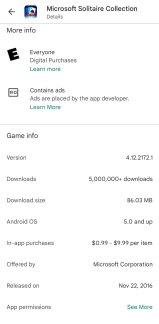The Google Play Store has removed the ability for users to see when apps have been last updated. The feature is standard across most mobile app stores as it serves as a useful tool for mobile owners to stay informed about their software, but now Android users are being kept in the dark. Although other information such as file size and version number is still publicly available in the Google Play Store, the removal of the “last updated” feature in the UI has puzzled many users.
This change seems to have been a long time coming as Google tested the waters in November by removing the feature for select users, however, it was met with backlash from fans. Following the tests, the feature was brought back, and it seemed as if the Play Store was going back to normal for good, but as of now, the “last updated” section is gone for all Android users.
Removing such a crucial piece of information is an odd move as many users check how frequently apps are updated before downloading them to see how well supported they are. Users who have already downloaded apps will also routinely check the store to see if long-awaited updates have gone live. Providing such information keeps users informed and doesn’t seem to have any downsides, but despite that, the feature is simply gone.

Those worried about the missing feature aren’t entirely out of luck, however. While the Play Store doesn’t show the information in the app anymore, it’s still available to be seen in the browser version. Anyone looking for it can hop on a computer (or just use their mobile browser) and find the information below the user reviews under the “Additional Information” section. It’s currently unclear how long the browser version of the Play Store will keep the feature, but it’s still up for now.

Android users have had a similar reaction to the change as they did when it was being tested in November 2021. Many have taken to Reddit to air their grievances, and some have even discussed making the switch to Apple products, citing the Google Play Store change as something of a final straw. When comparing the two app stores, the iOS App Store provides much of the same information as the Play Store, but keeps a detailed record of what changes have been made to apps and when they’ve been rolled out.
Editors' Recommendations
- Android 15 release date: When will my phone get the update?
- Google just released the first Android 15 beta. Here’s what’s new
- Everything you need to know about the massive Apple App Store outage
- A new Android 15 update just launched. Here’s everything that’s new
- Google Messages vs. Samsung Messages: Which app should you use?




